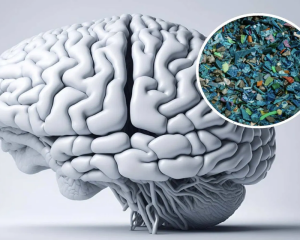While scientists don't fully understand the health impacts of MNPs in the brain, they are calling for more research to better understand whether they are harmful.
雖然科學家們尚未完全了解納米塑料在大腦中的健康影響,但他們呼吁進行更多研究,以更好地了解它們是否具有危害。
Studies have shown MNPs in arteries can be a risk factor for cardiovascular disease, and that cancer cells in the stomach can spread faster after contact with MNPs.
研究表明,動脈中的納米塑料可能是心血管疾病的風險因素,而胃中的癌細胞在與納米塑料接觸后可能會更快擴散。
"More and more studies show that plastics are present in the brain, including this new one, and they shouldn't be there," says Kasteel.
卡斯特爾表示:“越來越多的研究表明,塑料存在于大腦中,包括這項新研究,但它們不應該在那里。
"We don't know that much about the health effects, but the fact is that they are there and they shouldn't be there, and maybe that's worrying enough."
我們對健康影響知之甚少,但事實是它們確實存在,而且不應該存在,這可能已經足夠令人擔憂了。”
Campen's research team wants to look at the whole brain next, to understand if there's more plastic accumulation in one specific area, and to see if that links to any specific health outcomes.
坎彭的研究團隊希望下一步研究整個大腦,以了解是否存在某個特定區域的塑料積累更多,并觀察這是否與特定的健康結果有關。
While there is no way to completely avoid exposure to plastics, Kasteel says that on a personal level there are small choices you can make that can reduce exposure:
雖然無法完全避免塑料暴露,但卡斯特爾表示,在個人層面上,可以通過一些小的選擇來減少暴露:

minimizing single-use plastics, ventilating your home well and vacuuming regularly to remove dust and plastic debris, and avoiding cosmetic products that intentionally add MNPs like scrubs with plastic beads.
盡量減少一次性塑料的使用,保持家中通風良好并定期吸塵以清除灰塵和塑料碎片,避免使用添加納米塑料的化妝品(如含有塑料顆粒的磨砂膏)。
Scientists are also developing solutions to reduce microplastics in the environment.
科學家們還在開發減少環境中微塑料的解決方案。
There's a type of worm that eats polystyrene, and fungi and microbes that break down plastics in the environment
例如,有一種蠕蟲可以吃掉聚苯乙烯,還有真菌和微生物能夠分解環境中的塑料。
Scientists are developing new types of filters to remove MNPs from drinking water.
科學家們正在開發新型過濾器,以去除飲用水中的納米塑料。
"Plastic is everywhere. Most people cannot imagine a world without plastic, even if we stop producing plastic right now, the world will still be full of microplastics," says Kasteel.
卡斯特爾說:“塑料無處不在。大多數人無法想象一個沒有塑料的世界,即使我們現在停止生產塑料,世界上仍然會充滿微塑料。
"So it's good to think about mitigation measures, applying a precautionary principle, and seeing what we can do to minimize exposure, to maybe prevent certain health risks that there might be."
因此,考慮緩解措施、采取預防原則,并看看我們能做些什么來減少暴露,可能是預防某些潛在健康風險的好方法。”












